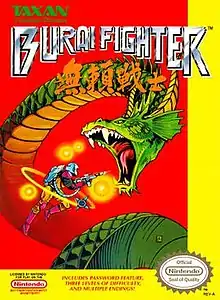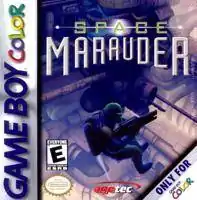Burai Fighter
Burai Fighter (無頼戦士, ブライ・ファイター, Burai Faitā) is a 1990 side-scrolling shoot 'em up video game for the Nintendo Entertainment System. The game was released in North America in March 1990, Europe and Australia in 1990, and Japan on July 20, 1990. The game was also ported to the Game Boy and retitled as Burai Fighter Deluxe, and was released in Japan on June 27, 1990, in North America in January 1991 and in Europe in 1991; this port eventually wound up on the Game Boy Color as Space Marauder, originally released in Japan as Burai Fighter Color.
| Burai Fighter | |
|---|---|
 North American NES box art | |
| Developer(s) | KID |
| Publisher(s) | |
| Producer(s) | Ken Lobb |
| Composer(s) | Norio Nakagata |
| Platform(s) | NES, Game Boy, Game Boy Color |
| Release | NES Game Boy Game Boy Color |
| Genre(s) | Side-scroller, shoot 'em up |
| Mode(s) | Single-player |
The setting for Burai Fighter, according to the manual, is to fend off seven bases of Burai, super-intelligent cyborgs. The player starts out with a relatively weak cannon but can upgrade to ring, laser, and missile weapons, which are much more powerful. The player can also choose from three difficulty settings: Eagle, Albatross, and Ace; the fourth difficulty setting, Ultimate, must be unlocked. The character can be moved in 8 directions and can shoot in a different direction from the direction he is moving towards.
Gameplay
Burai Fighter is a singleplayer two-dimensional automatic sidescroller. It has three difficulty levels to choose from. At the start, the screen moves from left to right, but it can move in any cardinal direction and change directions in the same level. The player is expected to keep up, as getting stuck on the edge means the player character dies. The player starts out with a basic gun that can fire in all eight directions. Holding down the fire button locks the player's firing direction. The player floats through space to destroy robots. At the end of a level they must defeat a boss to continue to the next level. At times the player may find a gap at the side of the screen. When the player moves into the gap with correct timing, the orientation of the screen changes and takes them into a secret room with some power-ups. Higher difficulty levels have fewer secret rooms and more precise timing is required. The game is fairly linear, but there are some forks in the path where the player can either travel on the left side or the right side of the screen for a little while. Some sides are more challenging than their counterparts.
Each level has a password that can be input to start at that level.
Weapons and power-ups
Power-ups can be collected during the game. The three guns that have unlimited ammo are the laser, the ring and the missile. Picking up a symbol will switch weapons and it will increase the player's counter of that weapon by one. If the counter hits five, that weapon reaches level two. Weapons can be boosted to level three. If the player loses a life they also lose the upgrade for the weapon they were using. The maxed out laser fires diagonally in four directions, the ring has a front spread and the missile fires vertically and horizontally. The ring can pierce through enemies, which makes it a handy weapon against hard to reach spots. Every boss is weak against a particular kind of weapon, so it pays off to bring the right one into battle. With enough resources, the player can deploy cobalt bombs that inflict damage to all enemies on the screen; they do not damage bosses. Completely filling the cobalt meter gives the player an extra life at the cost of their whole supply. Speed can be upgraded with the S symbols, and the rotating shield can be upgraded by collecting the grey circle symbols.
Bosses
Giganticrab is the level one boss. He has three eyes on top of his head that must be destroyed before it corners the player with its body or antennae.
The level two boss is Jawispede, a big worm that splits into three pieces that must be destroyed.
Level three is an overview perspective level where the player must look for a base with many firing eyes. It has no automatic scrolling.
Fangskull is the level four boss.
The level five boss is a fire demon named Torchwing. It will launch fireballs at the player.
Level six is another overview perspective level with a slightly larger base the player needs to destroy.
Slimedragon is the end boss of the game. The player only fights his head. It fires massive homing projectiles at the player.[5]
Plot
The Burai are an intelligent race bent on complete domination of the entire universe. They have seven facilities across the galaxy that produce their troops that are half robot, half animal. Only the unnamed protagonist can save the universe with his proton suit and laser gun.[5]
Game Boy Color port

Space Marauder (known as Burai Senshi Color in Japan[3]) is a colorized version of the Game Boy version. It was developed and published by KID in Japan and Agetec in North America. It was released in Japan on July 23, 1999, and in North America on August 28, 2000.
Space Marauder is a scrolling shooter, and has been compared to NES and SNES era shooter games such as Space Megaforce.[6] The game puts the player in the role an infantryman dropped into an alien base that is determined to enslave humanity.[6] There are three different power-ups, and the game allows you to shoot in eight different directions. However, due to the difficulty of switching the direction of fire during the midst of battle, it is regarded to be easier to just shoot in one direction.[6] The three power-ups are considered standard for the genre: a blue bullet, a lighter blue laser, and a pink laser.[6] The game uses a password system to continue progress.[6]
Space Marauder received marginally positive reviews from critics. Nintendo Power gave the game a 6.4 out of 10.[4] IGN, the only other major critical site to give the game a score, awarded the game a 6 out of 10, noting its old school factor and complimenting the usage of a genre that had been long dead.[6]
References
- Burai Fighter Release Information for NES, GameFAQs, archived from the original on 2012-10-13, retrieved 2013-09-04
- Burai Fighter Deluxe Release Information for Game Boy, GameFAQs, archived from the original on 2012-10-14, retrieved 2013-09-04
- http://www.gamefaqs.com/portable/gbcolor/data/577114.html
- GameSpot. http://www.gamespot.com/gbc/action/spacemarauder/tech_info.html
- 3
- Nix, Marc (September 14, 2000). Space Marauder Review for Game Boy Color. IGN. Retrieved on February 11, 2008.